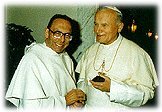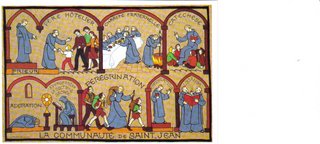 With the news of Fr. Philippe's passing, I decided to spend parts of today listening to Bach's Mass in B-minor and Mozart's Requiem. Both powerful pieces. The Requiem still being one of my favorite pieces to get lost in and fall into a spiritual dimension of play.
With the news of Fr. Philippe's passing, I decided to spend parts of today listening to Bach's Mass in B-minor and Mozart's Requiem. Both powerful pieces. The Requiem still being one of my favorite pieces to get lost in and fall into a spiritual dimension of play.Well, I also decided to read some from Fr. Philippe. There is so much to choose from. You can see some of his works translated into English here.
The Community's site has a link to an anecdote that I heard some time ago while visiting them and is still one of my favorite stories about Fr. Philippe. Here it is:
Jean Guitton used to like to go to Châteauneuf-de-Galaure, a small village in the department of the Drôme, southern France, to see Marthe Robin, a mystic who suffered the stigmata and who was foundress of the Foyers de charité (Houses of Charity). A Dominican priest also used to go regularly to Châteauneuf-de-Galaure to give retreats and to meet with Marthe Robin. On one particular occasion someone mentioned to Jean Guitton that Father Marie-Dominique Philippe had just arrived. “Which one?” asked Guitton, “The author of The Mystery of Mary or the author of An Introduction to the Philosophy of Aristotle? Guitton’s friend replied that these authors were one and the same person. Amazed, Jean Guitton exclaimed, “But that’s impossible!”
This brief anecdote points to the unusual and little-known journey of a man who has often gone against the current, pursuing an intense philosophical research in an age when philosophy is no longer studied, and who, in an age when the religious life has fallen upon hard times in many ecclesiastical circles, has founded a new religious community that has spread throughout the world. Father Philippe, both as a thinker and as a religious, is not someone whom it is easy to classify. He closely follows developments in modern philosophical thought and for over forty years has maintained a fruitful dialogue with scientists, psychoanalysts and other intellectuals whose fields of research are quite different from his own. He has published books on mathematics, art and medicine, at the same time as preaching retreats to Carmelites on The Song of Songs and St. John’s Apocalypse. His undying loyalty to the Magisterium of the Catholic Church has often earned him the label “traditionalist”.
Many misunderstandings, in fact, arise from his attachment to St. Thomas Aquinas and to Aristotle. As a result of what seems to us a superficial reading of Father Philippe, many view his philosophical and theological thought as Scholastic Thomism. Some are delighted at this revival of the “good old Thomistic tradition” which has been beaten into the corner by the contemporary philosophies that have produced modern day atheism. Others deplore this out-of-date, obscure thought - which seems to confuse the radically different perspectives of the philosopher and the theologian - as totally ineffective in the modern world.
To our mind, a more attentive study of Father Marie-Dominique Philippe’s thought (of which this book offers the possibility) reveals that his personal reflections are consciously developed with the intention of distinguishing clearly the starting point of the philosopher’s work (i.e. experience) and the starting point of the theologian’s work (i.e. faith) - something which Scholastic Thomism has never done. It also seems that Father Philippe’s thought is characterised by a constant concern to return to the source, both to the source of western philosophy - in order to take up once more and continue the diligent search for truth begun by the ancient Greeks - and to the source of Faith, that is, the Gospels, seeking to develop a mystical theology based upon the writings of St. John.
Fr. Marie-Dominique Philippe, OP
1912-2006
Requiescat in pace



